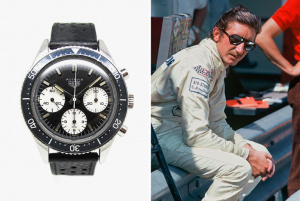Difference between revisions of "The Racers Chronograph"
| Line 1: | Line 1: | ||
| − | ==The | + | ==The Racers Chronograph== |
[[File:Autavia-Siffert.jpg|thumb|Heuer Autavia]] | [[File:Autavia-Siffert.jpg|thumb|Heuer Autavia]] | ||
The [[Heuer]] [[Autavia]] started life as a dashboard timer in the 1930s, used in both racing cars and aeronautics. The original Autavia was eventually replaced by the Monte Carlo and the Auto-Rallye, but in the early ’60s when Jack [[Heuer]] was looking to revamp his range of chronographs he returned to the Autavia name. The resulting watch was the first Heuer chronograph with a rotating bezel. In 1967 when [[Heuer]] launched a new case design, it included a tachymeter scale on the rotating bezel. This made more complex measurements easier; thanks to Heuer’s reputation on the dashes of earlier rally cars, the [[Autavia]] (and later [[Heuer]] Chronos like the [[Heuer Monaco|Monaco]]) became a hit with racers like Mario Andretti, Jochen Rindt and Jo Siffert in the ’60s and through the’70s. And while Heuer’s [[Heuer Monaco|Monaco]] and Carrera are considered the brand’s greatest racing chronographs, the [[Autavia]] started that foundation. | The [[Heuer]] [[Autavia]] started life as a dashboard timer in the 1930s, used in both racing cars and aeronautics. The original Autavia was eventually replaced by the Monte Carlo and the Auto-Rallye, but in the early ’60s when Jack [[Heuer]] was looking to revamp his range of chronographs he returned to the Autavia name. The resulting watch was the first Heuer chronograph with a rotating bezel. In 1967 when [[Heuer]] launched a new case design, it included a tachymeter scale on the rotating bezel. This made more complex measurements easier; thanks to Heuer’s reputation on the dashes of earlier rally cars, the [[Autavia]] (and later [[Heuer]] Chronos like the [[Heuer Monaco|Monaco]]) became a hit with racers like Mario Andretti, Jochen Rindt and Jo Siffert in the ’60s and through the’70s. And while Heuer’s [[Heuer Monaco|Monaco]] and Carrera are considered the brand’s greatest racing chronographs, the [[Autavia]] started that foundation. | ||
Interesting fact: [[Autavia]] is a combination of both “auto” and “aviation” | Interesting fact: [[Autavia]] is a combination of both “auto” and “aviation” | ||
Latest revision as of 02:50, 5 April 2020
The Racers Chronograph
The Heuer Autavia started life as a dashboard timer in the 1930s, used in both racing cars and aeronautics. The original Autavia was eventually replaced by the Monte Carlo and the Auto-Rallye, but in the early ’60s when Jack Heuer was looking to revamp his range of chronographs he returned to the Autavia name. The resulting watch was the first Heuer chronograph with a rotating bezel. In 1967 when Heuer launched a new case design, it included a tachymeter scale on the rotating bezel. This made more complex measurements easier; thanks to Heuer’s reputation on the dashes of earlier rally cars, the Autavia (and later Heuer Chronos like the Monaco) became a hit with racers like Mario Andretti, Jochen Rindt and Jo Siffert in the ’60s and through the’70s. And while Heuer’s Monaco and Carrera are considered the brand’s greatest racing chronographs, the Autavia started that foundation.
Interesting fact: Autavia is a combination of both “auto” and “aviation”
